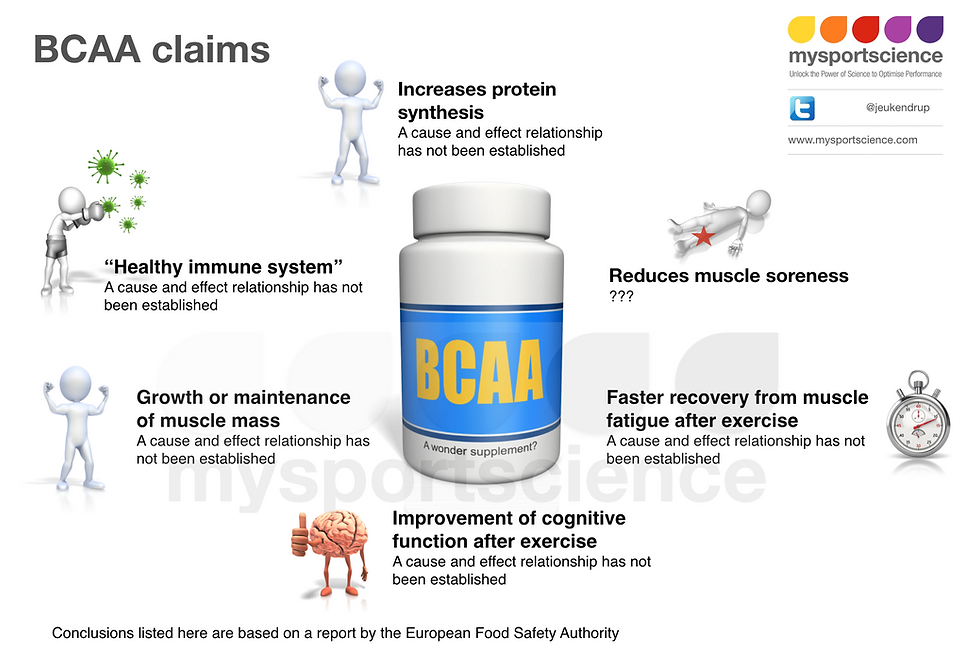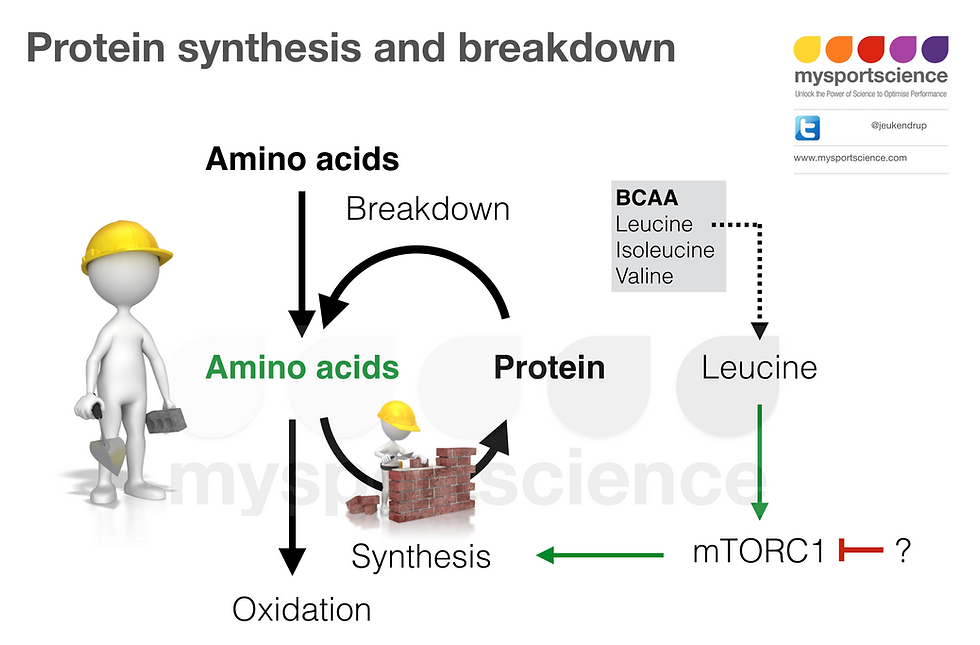The truth about BCAA
- Asker Jeukendrup
- May 3, 2020
- 4 min read

Over the past few years branched-chain amino acid (BCAA) supplements have become very popular sports nutrition products. Proponents of BCAA supplements claim many benefits related to recovery from intense exercise. These claims range from enhanced muscle protein synthesis (MPS) and decreased muscle protein breakdown (MPB) to protection of the immune system, increased fat oxidation and decreased muscle soreness, among many others. The physiological rationale for these claims, let alone robust evidence from well-controlled human studies, is often weak, if not completely lacking. In the infographic above the European Food Safety Authority (EFSA) verdict is listed with each of the claims.
Probably the most common claim for the efficacy of BCAA supplementation is enhanced muscle growth with resistance exercise training. As regular readers of this site will know, the metabolic mechanism for muscle growth is net muscle protein balance. In other words: you are making more protein than you are breaking down. – in particular myofibrillar protein balance (the synthesis of contractile proteins). The balance between the rates of MPS and MPB over a given time period determine whether muscle mass is increased or decreased. BCAA consist of three essential amino acids, leucine, isoleucine and valine. BCAA not only provide building blocks for making new proteins, i.e. muscle protein synthesis (MPS), as do the all other amino acids, but act as stimulating compounds for the molecular anabolic pathways in muscle. There is evidence that BCAA are effective for stimulation of MPS and inhibition of MPB from cell and animal studies (since at least the 1970s). However, as we’ll see, the evidence for the efficacy of BCAA for muscle hypertrophy in humans is, at best, weak and, at least, equivocal – at least in healthy, young folk.

It is very clear, from studies in cells, animals and even in humans following exercise, that BCAA (leucine is by far the most important player here) stimulate the mTOR pathway, i.e. the molecular pathway that ‘turns on’ MPS. That is a very important function for BCAA. This stimulation is often cited as the rationale for recommending BCAA supplements to those interested in "getting huge". However, the stimulation of the mTOR pathway, in and of itself, is not the end-all-to-be-all for muscle growth. See an earlier blog on the limitations of relying on molecular data to make recommendations about nutrition. So, the question is, how effective is BCAA supplementation for stimulation of MPS so that muscle growth is enhanced? Unfortunately, despite the potential for BCAA to enhance muscle hypertrophy and the available evidence from cell and animal studies, there is a distinct lack of convincing data from studies in healthy, young weight lifters.
The problem with BCAA supplements alone, i.e. without the other essential amino acids, is that all of the necessary building blocks to make new proteins are not available for maximal stimulation of MPS. We recently demonstrated that post exercise MPS was increased with ingestion of BCAA (1), but the stimulation was only about half of that measured following ingestion of intact whey protein, i.e. all of the essential amino acids. The explanation for this result is that the BCAA stimulate the system, but that there are insufficient EAA to supply the substrate to sustain MPS. This notion is supported by studies from Prof Stu Phillips’ lab. Thus, it can be said that BCAA stimulate MPS following resistance exercise, but the response is much better with ingestion of an intact protein that provides all the EAA necessary to sustain maximal MPS.
In addition to stimulation of MPS, BCAA supplements are touted as ergogenic agents for a number of other reasons. One prominent rationale for use of BCAA supplements is to alleviate muscle damage. There is some evidence for this claim, including a study we published a few years ago (2) showing that BCAA supplementation reduced muscle soreness following damaging exercise. However, there was no discernible impact on muscle function in that study. So, with a relatively modest decrease in muscle soreness and no impact on muscle function, it is not clear how practically useful BCAA supplements would be for recovery from intense, damaging exercise. Moreover, other studies have not been able to demonstrate effectiveness of BCAA supplementation for reducing symptoms of muscle damage. So, at best we must consider the use of BCAA supplements to reduce muscle damage as equivocal.
In summary, overall, based on the available evidence, the best nutritional recommendation to optimize adaptations to training, including muscle hypertrophy and enhanced oxidative metabolism, would still be to eat sufficient high-quality protein (that naturally includes BCAA, of course) in the context of meals. At present, we do not believe there is sufficient evidence to recommend BCAA supplements for enhancing muscle anabolism or alleviating muscle damage or, for that matter, for any other reason.
References
2. Jackman SR, Witard OC, Jeukendrup AE, Tipton KD. Branched-chain amino acid ingestion can ameliorate soreness from eccentric exercise. Med Sci Sports Exerc. 42(5):962-70, 2010.





Comments